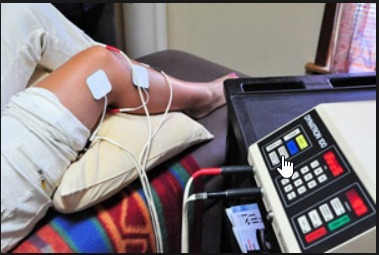
Interferential current therapy is a non invasive pain management therapy that employs electrical stimulation to heal and relieve pain in damaged tissues. Interferential therapy in Chennai is widely applied to boost the body’s ability to respond to pain, besides accelerating blood circulation and produces hormones to enhance healing process.
A constant frequency is applied to one of the electrodes in a pair to which a slightly different frequency is applied to another electrode. Together, they produce an amplitude modulated medium frequency also known as beat frequency, in the tissue. Four pole configurations are also used for healing purposes in interferential therapy.
These intermittent pulses block pain signals and stimulate affected tissue and relieve pain. IFT is basically used for treating chronic, post traumatic, post surgical pains. Spine specialist Dr Karunakaran, backed by more than two decades of experience, provides Interferential therapy in Chennai.
Interferential therapy (IFT) is all about dispatching electrical stimulation to damaged tissue in one’s body with a view of accentuating natural process of responding to pain. It is employed to treat chronic, post trauma and post surgical pain. It is popular owing to its non drug, non invasive attributes and can be taken at the comfort of one’s own home. Medical supervision is inevitable since it employs electric currents.
Interferential therapy exists since early 1950s, with some confusion and misconceptions wrapped around its safety and efficacy attributes. However, it is best employed with prescribed treatment protocols.
The original concept or true interferential was designed by Austrian doctor named Hans Nemec. A second method, named pre-modulated interferential developed in the recent past where both electrodes had 4000Hz frequency and each of them had capacity to pre-modulate or burst frequency within the unit and create pre-modulated interferential. While probing the credentials of these two methods, pre-modulated interferential is advantageous.
Interferential therapy in Chennai is used in clinics as an option to relieve pain and boost self-healing process and enables patients to regain health and return to normal state. Interferential therapy delivers high frequency signals that penetrate through the skin and reach muscle tissues that lie deep inside.
IFT is a physiotherapy modality employed to deliver pain relief by producing endogenous opioids such as endorphins and enkephalins. It also aims to increase blood flow and produce hormones that enhance the healing process.
Interferential therapy is used in orthopedic therapy to treat injured tissue for many numbers of years. It stimulates parasympathetic nerve fibres to increase blood circulation and mitigates fluid retention and consequently enhances the healing process.
In a pair of electrodes, a specific frequency is set to one electrode, while a slightly different frequency is applied to the other. 4000Hz carrier wave incites deep penetration to prevail over skin resistance. Earlier analog circuits in form of waves were used for this purpose.
The two frequencies crossover and procure a lower frequency which is termed as therapeutic current. Therapists use movable electrodes to spot best electrode positions.
No side effects were reported though.
The intermittent pulses caused by IFT excite surface nerves and block pain signals in the damaged tissue. Consequently blood circulation is increased and muscles are stimulated.
Four main clinical applications of interferential therapy include pain relief, muscle stimulation, increased local blood flow and reduction of oedema or fluid retention.
It is used to treat ailments including joint injuries, tennis elbow, injuries in back, neck and shoulder, knee and also in fibromyalgia, carpet tunnel syndrome and inflammation or edema.
Exercises such as stretching injured muscles, moving stiff joint and strengthening muscle groups to support joints, are clubbed with interferential treatments.
Interferential therapy in Chennai is used in sports medicine sector, to treat athletes who suffer sudden pain while going through intense exercises.
Researchers reportedly conclude that interferential current combined with another intervention was more effective in pain mitigation than individual IFT, placebo or any other treatment. It is also admitted that heterogeneity found in the studies and methodological limitations could not arrive at conclusion about pain healing efficacy though.
Besides mitigating pain and increasing blood circulation, IFT also removes waste substances from the affected area and increases metabolic rate.
Interferential therapy is not advisable for those suffering from conditions including arterial disease, deep vein thrombosis, pregnant uterus, haemorrhage, malignancy, pacemaker, mensuration, fever, large open wounds and dermatological disorders.
Those aged below 12 require doctor’s prescription to employ IFT and are normally not eligible for interferential therapy.
Besides interferential therapy, Transcutaneous electrical nerve stimulation (TENS) is also popular. IFT is advantageous of the two, owing to deeper penetration of tissue, better comfort and increased blood circulation. While IFT stimulates muscle motor nerves, TENS stimulate nerve endings to minimize pain.
Interferential therapy poses side effects when guidelines are not followed. The side effects include skin irritation, rashes caused by adhesives on electrodes and burning sensation due to overuse. Opioids like synthetic tramadol may cause side effects like sedation, dizziness and loss of alertness.